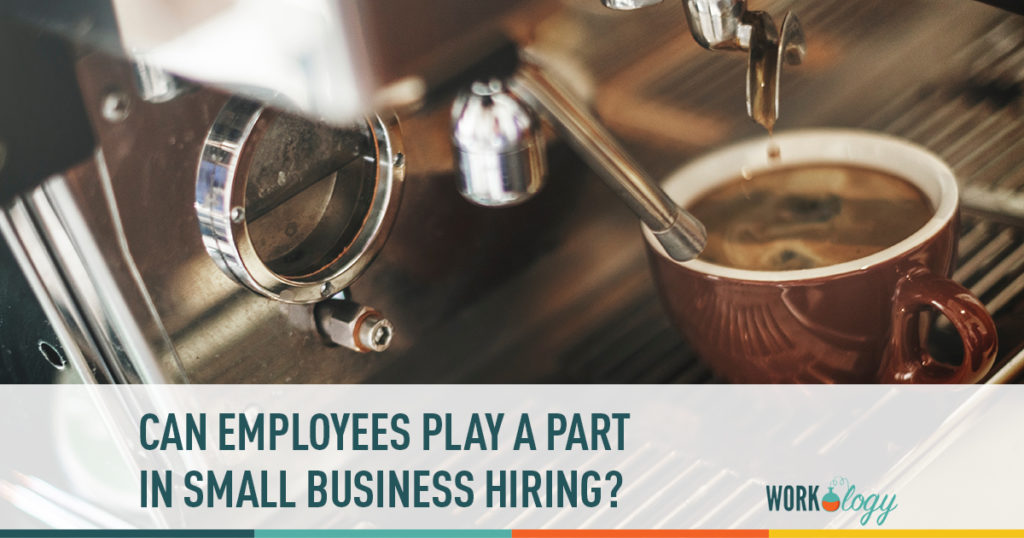Meet the team interviews and tryouts are increasingly common in the tech industry. In some organizations, team members play as important a role as human resources and managers, casting the final ballot on cultural fit and qualifications. The advantage of involving employees in the hiring process is that, by leveraging their expertise as well as your own, you have a better chance of picking candidates who really fit the team. But that’s the tech industry – can the same tactics work for other small businesses that don’t have VC backers?
Can Employees Play a Part in Small Business Hiring?
The budget for human resources functions in small businesses typically isn’t very big. Often managers or owners perform all the functions that an HR generalist might in a mid to large size company. That can lead to some staid thinking around the recruiting and hiring process, with managers scrambling to fill empty positions quickly and within budget. In that context, involving employees in the recruiting and hiring process might seem like a risky experiment, but it’s the opposite.
Small business HR can suffer because of its comparative lack of resources, or it can make the most of what it has. A small business may not be able to pull together a star recruiting team, but it does have experts on hand who know exactly what the job demands, and what kind of personality will fit best with the team you already have: your employees. No one knows what it’s like to work in your business better than your employees, and no one is more invested in seeing the best candidates succeed. (Well, almost no one, but you already know who your less than engaged employees are, don’t you?) Rather than being a cost, employee participation can bring you savings, as it minimizes turnover.
What That Looks Like in Small Businesses
So what does employee participation in small business hiring look like? The days-long tryouts that some tech companies opt for are out of the question in a truly small business, as are lengthy recruitment processes involving multiple interviews. Keeping costs contained is essential to an efficient and effective hiring process, after all.
Start A Referral Program
An employee referral program is the easiest way to bring your existing team into the hiring process, one that reliably produces good candidates and that’s fairly easy to set up. Referral programs, wherein your team members help to funnel the best candidates they know into your recruiting process, require only two things:
1) Clearly communicated and accessible information about current open positions.
2) Incentives that are transparently rewarded.
Getting started will take a little education, as you explain your new program to your employees, but after that it’s simple: post openings in a public place like the break room with clear instructions on how to make a referral, and an explanation of how incentives will be rewarded. To get the most out of your referral program it’s crucial that you be open and honest about the process, never letting anyone feel cheated.
Consider Peer Recruiting
Peer recruiting involves employees in the hiring process in a more direct way. It can consist of employees helping to scout, screen, or interview employees. Peer recruiter’s roles may also extend through to the onboarding process, as they help new hires complete essential paperwork and learn the ins and outs of the company. Peer recruiting is more of an investment than a referral program, because it requires setting up systems of training and accountability, but it also comes with a bigger impact.
These programs lift some of the weight you’ve been carrying, and they pair new hires with position experts who better understand the kinds of questions a new employee might have. But most importantly, they tap the knowledge and passion of your most important resources: your employees.
When I started out as a recruiter, it was as a part time peer recruiter, in addition to my regular job. I pulled likely resumes out of the pile and screened candidates over the phone. From there, I graduated to in person interviews, running orientations, and eventually taking the lead on our hiring process as a whole. Not only did our peer recruiting program help to find good candidates outside the company, it helped to identify internal candidates who might be ready for new responsibilities or even a new role.
A referral program combined with a peer recruiting program – as long as your peer recruiters have no contact with their own referrals – is the best use of your employees’ expertise.
Getting Employees On Board
If your employees are used to making decisions and taking ownership of their work, bringing them into the hiring process will be mostly a matter of determining the scope of their participation and how you can incentivize it. Not every employee will want to take on additional duties, even it means extra pay or other incentives, and not every employee will be suited for helping to screen new candidates.
If, on the other hand, your employees aren’t used to being a workplace partner, trying to bring them into the hiring process will be difficult. They aren’t, after all, used to thinking strategically or about the long term good of your business, and chances are they aren’t particularly engaged. Tun that around by normalizing participation in workplace decisions, giving employees responsibility balanced with accountability.
After all, productively challenged employees are engaged employees, and engaged employees produce the best referrals and feedback about candidates.









